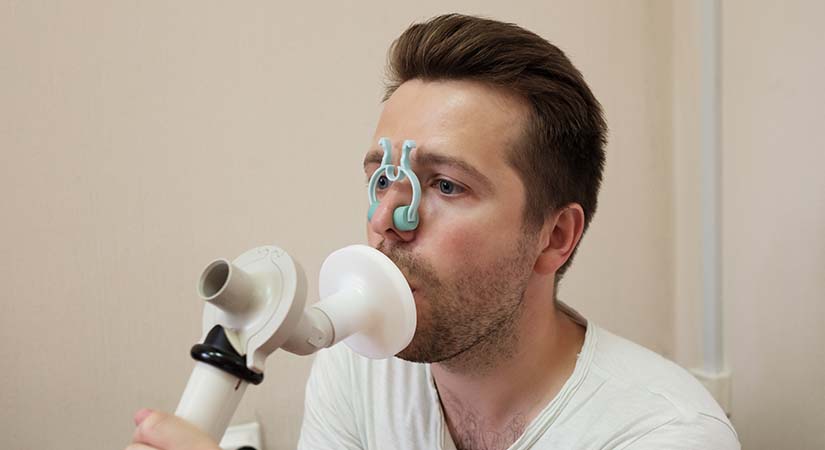
Pulmonary Function Tests
Pulmonary function tests are non-invasive procedures that test the functioning of the lungs. Dr Sigauke will measure how well you inhale and exhale, whether your lungs are transferring enough blood to the heart and if you have any underlying conditions affecting your breathing and heart.
What is the purpose of PFTs?
The primary purpose of lung function tests is to diagnose and monitor lung conditions. Dr Sigauke may request one or more PFTs to understand your condition better.
Some of the common conditions that PFTs diagnose are:
- Asthma
- Respiratory issues and infections
- Bronchitis
- Chronic obstructive pulmonary disease (COPD)
- Sarcoidosis
- Lung fibrosis
- Scleroderma
What are the different types of PFTs?
Dr Sigauke provides several different PFTs performed at his office at Melomed Bellville Private Hospital.
Spirometry
Spirometry is commonly used to diagnose asthma and chronic obstructive pulmonary disease (COPD) by testing how well you inhale and exhale. The procedure is performed using a spirometry machine, where Dr Sigauke will ask you to take deep breaths in and quick breaths out through a mouthpiece with your nose pinched.
Bronchial Provocation Test
A bronchial provocation test uses 3 methods to test for asthma. Dr Sigauke will either expose you to a trigger, such as smoke, ask you to exercise or inhale chemical methacholine, which constricts the airways. In all of these instances, Dr Sigauke will monitor the reaction of your lungs to determine if you have difficulty breathing due to airway inflammation and constriction.
Body Plethysmography
A plethysmography test checks your lung capacity or volume. Dr Sigauke will ask you to inhale and exhale into a mouthpiece that determines how much air your lungs can hold and how much air remains in your lungs after exhaling.
Pulse Oximetry Test
A pulse oximetry test uses a small probe device to check the amount of oxygen in your red blood cells. The pulse oximetry device is onto your finger, earlobe, forehead or toe and provides a reading of your oxygen levels. Anything under 95% may indicate that you have a respiratory problem.
Cardiopulmonary Exercise Test (CPET)
A cardiopulmonary exercise test is an advanced stress test that evaluates your heart, lungs, blood vessels and muscles. You will be required to walk on a treadmill or cycle on a stationary bike while Dr Sigauke measures your heart rate, blood pressure and breathing. This is done through electrode patches on your chest, arms and legs and breathing into a tube as you exercise.
Exhaled Nitric Oxide Test
An exhaled nitric oxide test specifically diagnoses allergic asthma, a condition that causes elevated levels of nitric oxide, which leads to inflammation of the airways. The test is performed similarly to a spirometry test, whereby you must breathe through a mouthpiece attached to a monitor.
Lung Diffusion Capacity
Lung diffusion is the amount and rate at which oxygen is transported from the lungs to the bloodstream. Dr Sigauke will ask you to breathe into a tube connected to a machine that releases small amounts of carbon dioxide as you inhale. From this, Dr Sigauke can determine if you have lung disease.
Arterial Blood Gas Test
An arterial blood gas test looks at the amount of gas in your blood, such as carbon dioxide and oxygen. Dr Sigauke performs this procedure by taking a sample of blood from one of your main arteries, most likely through your wrist.
How to prepare for PFTs
Dr Sigauke will advise you on any precautions you need to take before your procedure, such as stopping certain medications, but it's best to be aware of how to prepare for your tests.
- Avoid smoking, eating or drinking for a few hours before your procedure
- Limit or stop taking medications Dr Sigauke has informed you of
- Avoid strenuous exercise before your procedure
It's also vital to avoid any strenuous exercise or activity that may make you tired, as performing several PFTs can cause fatigue and lightheadedness.
Results of PFTs
Many lung function test results are available immediately, and Dr Sigauke will be able to diagnose your condition and provide a treatment plan. However, other test results may require further testing and will be sent to a pulmonologist who specialises in lung health. In this case, Dr Sigauke will set up a follow-up consultation to discuss your results.

